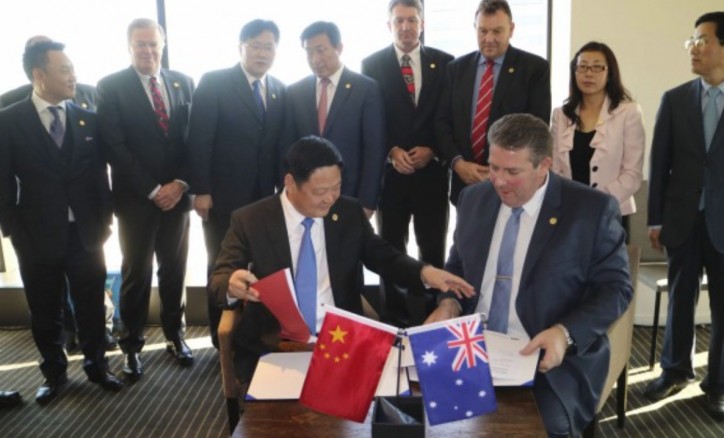In a marriage of Chinese geopolitics and industry policy, a new shipping company wants to put Tasmania at one end of the fabled Silk Road trade route through China to Europe.
Great Southern Shipping Australia and Rizhao Port group of China plan a new container shipping line plying a triangular weekly route from Rizhao, on China's central east coast, to Brisbane, Sydney, Bell Bay, Melbourne, Fremantle and return.
The new Chinese-Australian venture expects retailers Wesfarmers and Woolworths, food groups Murray Goulburn, Simplot and SPC Ardmona and packaging groups Orora, Visy and Owens Illinois to use the route, helping to fill the ships both ways and improve the economics of the line.

Dhu Chuangzhi, chairman of Rizha Port Group, and Paul van Oost, Chief Executive of Great Southern Shipping Australia, ink their venture at Hilton Melbourne, South Wharf, Docklands, Melbourne in May
The Chinese government has invested heavily in extending Silk Road railways to Rizhao, the world's 11th largest port, and is keen to expand the port's container traffic. Rizhao lies between Shanghai to the south and the "three ports" of Qingdao, Tianjin and Dalian to the north and is already the largest destination for Australian resource exports.
The new route will improve container services to and from China for Western Australia and Tasmania, making their exports more competitive. Great Southern Shipping director Eddie Wong said the new line would provide China easier and quicker access to in-demand Australian goods from Tasmania, Victoria and Western Australia,
The shipping venture says it will become the first to run Australian-flagged container ships with foreign crews under an "international register" introduced by the former Labor government in 2011.
Great Southern Shipping, a partnership between Australian and Chinese shipping interests, will commission five container ships to ply the weekly route from Rizhao, targeting import, export and traditional coastal routes. As the route develops, the company could increase the fleet to 10 ships.
Under the rules spearheaded by then transport minister Anthony Albanese in 2011, Great Southern's container ships must have two Australian crew – typically a master and an engineer – but can use low cost foreign crews for all other roles to save costs. The reforms were designed to make Australian-flagged vessels internationally competitive to reverse a long decline in local merchant shipping. But they have taken five years to have any impact and in the meantime the number of Australian flagged "blue water" ships has halved to 14.
They came in for heavy criticism from business at the time because the government tightened the rules for using low cost foreign ships on coastal Australian routes – which had been relaxed by the Howard government to facilitate easier access – in the same bill.
Source: GSS